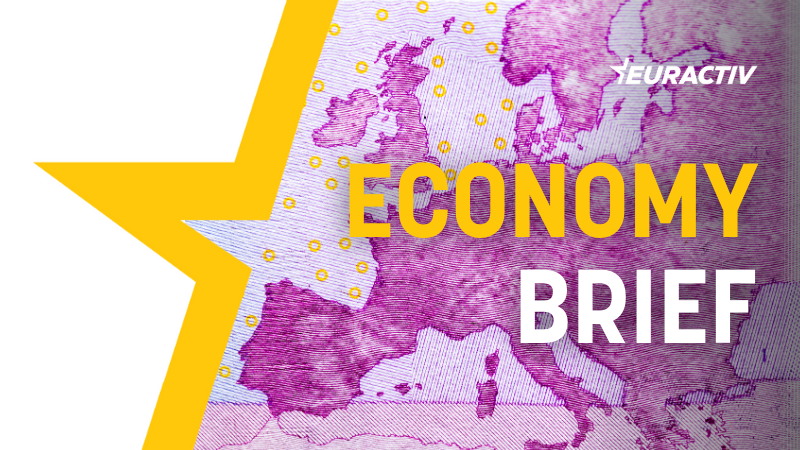 Euractiv is part of the Trust Project
Euractiv is part of the Trust Project
The European Investment Bank (EIB) tabled proposals to euro-area finance ministers on Monday (7 October) that would see the lender actively kickstarting the bloc’s Capital Markets Union plans and channelling funds to European companies seeking to scale up.
The head of the EU’s investment arm, Nadia Calviño, is pitching the Bank as a key vehicle to tackle the bloc’s private financing needs – charging ahead with a proactive tenure of the EIB, which saw her expanding its role beyond its more traditional development- and green-bank functions and boosting lending to defence projects earlier this year.
“The EIB is itself already a CMU instrument,” Calviño told reporters after presenting an “action plan [...] that will help channel savings into productive investments” to 20 EU ministers meeting in Luxembourg.
“The EIB Group plans to scale up support for the EU venture capital and private equity markets to help close the funding gap throughout the whole innovation and corporate cycle [..] to support the development of the Capital Markets Union,” she said.
“We're talking about ensuring that European companies, technologies that are born in Europe, stay in Europe and that we invest in Europe's champions, in Europe's unicorns,” Calviño added.
The proposals, which the EIB said in a separate statement were set out “after months of intensive engagement with member states and financial markets partners,” would have already received “broad support by the [bank’s] board of directors," as well as by its actual investment unit (the European Investment Fund, or EIF) last week.
This would consist of two main projects: an expansion of the EIB’s European Tech Champions Initiative—which was set up last year to lend high-growth capital to tech companies—and the creation of an “exit platform” to finance the acquisition or listing of start-ups in their later stages of growth.
The “tech champions” programme would leverage on the EIF’s operations as a so-called fund of funds – i.e. an investment fund that buys into different European asset managers’ portfolios allocating to European equities, so there wouldn’t be direct exposures to companies’ shares.
Meanwhile, Euractiv understands that the EIB is still mulling different options around the “exit platform” plan, which could see the EIB help larger companies buy late-stage start-ups or underwrite these start-ups' share issues into the public market.
The bank now expects these proposals to be “further discussed and finalised” with the EU’s 27 finance ministers – who act as the bank’s governors - “and in partnership with the European Commission.”
Spain pitches small-scale CMU ‘sandbox’
Calviño wasn’t the only one throwing her hat into the ring to get the ball rolling on the bloc’s private funding markets plans.Also talking on the sidelines of the Eurogroup meeting, Spain’s Economy and Trade Minister, Carlos Cuerpo, unveiled the country wants to propose to the European Commission a smaller-case “laboratory of competitiveness”- or a CMU “sandbox,” he said - starting with a minimum of three countries.
“Spain will put forward a first contribution to the competitiveness debate,” the Spanish minister said, to try to move forward with integrating EU markets “and take decisions in a [more] agile and quick way”.
“To start this mechanism of integration, we began with a proposal for the establishment of a [common] European standard for SME ratings,” Cuerpo said.
“This would allow SMEs to access easier and more stable financing,” he said, while allowing authorities to “monitor the impact and the effect of this catalyst of integration” he added.
The Commission would then evaluate the experiment to determine whether it should be scaled-up to the 27 member states, Cuerpo said.
Cuerpo said accelerating CMU plans was a matter of “urgency and emergency”: “We cannot afford to waste any time on the issue of competitiveness,” he said.
Based on a draft of Spain’s proposals obtained by Euractiv on Tuesday (8 October), the CMU “laboratory” could also involve initiatives relating to the harmonisation of retail investment products, securitisation, and “regulatory simplification”.
Cuerpo’s proposals follow similar plans by France’s former finance minister Bruno Le Maire, who had said earlier this year that initiating a CMU “with 27 member states is a non-starter" and tried to “launch a Capital Markets Union on a voluntary basis.”
Eurogroup chief warns against two-speed CMU
At the end of Monday’s meeting, however, the head of the Eurogroup, Paschal Donohoe, was quick to raise concerns on any such plan of a two-speed CMU.While the Spanish initiative “goes in the right direction” and “is encouraging”, he said, it comes “at a time in which we are all reaffirming the value of the single market, the value of a level playing field and the importance of deepening the single market within financial services.
“I hope that ideas like this act as a catalyst for deepening our commitment to move forward together and for us all to take a step forward together so that we don't have any risks of fragmentation."
“When we see initiatives like this come forward, I always have to reaffirm as president of the Eurogroup that my strong preference is for all countries to move forward together [...] for action to be taken across the entire Eurogroup or even across the entire European Union," the Irish official said.
"One country's enhanced cooperation could be another country's risk of single market fragmentation," Donohoe said.

 euractiv.de
euractiv.de
 euractiv.fr
euractiv.fr
 euractiv.es
euractiv.es
 euractiv.it
euractiv.it
 euractiv.pl
euractiv.pl
 euractiv.bg
euractiv.bg
 euractiv.cz
euractiv.cz
 euractiv.gr
euractiv.gr
 euractiv.ro
euractiv.ro
 euractiv.sk
euractiv.sk






